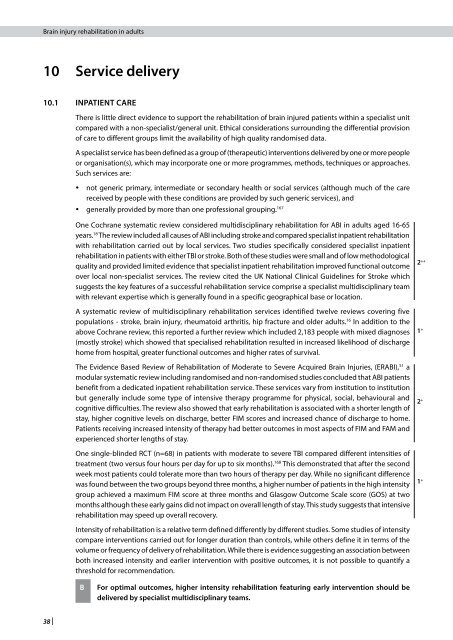sign130
sign130
sign130
Create successful ePaper yourself
Turn your PDF publications into a flip-book with our unique Google optimized e-Paper software.
Brain injury rehabilitation in adults<br />
10 Service delivery<br />
10.1 INPATIENT CARE<br />
38 |<br />
There is little direct evidence to support the rehabilitation of brain injured patients within a specialist unit<br />
compared with a non-specialist/general unit. Ethical considerations surrounding the differential provision<br />
of care to different groups limit the availability of high quality randomised data.<br />
A specialist service has been defined as a group of (therapeutic) interventions delivered by one or more people<br />
or organisation(s), which may incorporate one or more programmes, methods, techniques or approaches.<br />
Such services are:<br />
y not generic primary, intermediate or secondary health or social services (although much of the care<br />
received by people with these conditions are provided by such generic services), and<br />
y generally provided by more than one professional grouping. 167<br />
One Cochrane systematic review considered multidisciplinary rehabilitation for ABI in adults aged 16-65<br />
years. 18 The review included all causes of ABI including stroke and compared specialist inpatient rehabilitation<br />
with rehabilitation carried out by local services. Two studies specifically considered specialist inpatient<br />
rehabilitation in patients with either TBI or stroke. Both of these studies were small and of low methodological<br />
quality and provided limited evidence that specialist inpatient rehabilitation improved functional outcome<br />
over local non-specialist services. The review cited the Uk National Clinical Guidelines for Stroke which<br />
suggests the key features of a successful rehabilitation service comprise a specialist multidisciplinary team<br />
with relevant expertise which is generally found in a specific geographical base or location.<br />
A systematic review of multidisciplinary rehabilitation services identified twelve reviews covering five<br />
populations - stroke, brain injury, rheumatoid arthritis, hip fracture and older adults. 16 In addition to the<br />
above Cochrane review, this reported a further review which included 2,183 people with mixed diagnoses<br />
(mostly stroke) which showed that specialised rehabilitation resulted in increased likelihood of discharge<br />
home from hospital, greater functional outcomes and higher rates of survival.<br />
The Evidence Based Review of Rehabilitation of Moderate to Severe Acquired Brain Injuries, (ERABI), 51 a<br />
modular systematic review including randomised and non-randomised studies concluded that ABI patients<br />
benefit from a dedicated inpatient rehabilitation service. These services vary from institution to institution<br />
but generally include some type of intensive therapy programme for physical, social, behavioural and<br />
cognitive difficulties. The review also showed that early rehabilitation is associated with a shorter length of<br />
stay, higher cognitive levels on discharge, better FIM scores and increased chance of discharge to home.<br />
Patients receiving increased intensity of therapy had better outcomes in most aspects of FIM and FAM and<br />
experienced shorter lengths of stay.<br />
One single-blinded RCT (n=68) in patients with moderate to severe TBI compared different intensities of<br />
treatment (two versus four hours per day for up to six months). 168 This demonstrated that after the second<br />
week most patients could tolerate more than two hours of therapy per day. While no significant difference<br />
was found between the two groups beyond three months, a higher number of patients in the high intensity<br />
group achieved a maximum FIM score at three months and Glasgow Outcome Scale score (GOS) at two<br />
months although these early gains did not impact on overall length of stay. This study suggests that intensive<br />
rehabilitation may speed up overall recovery.<br />
Intensity of rehabilitation is a relative term defined differently by different studies. Some studies of intensity<br />
compare interventions carried out for longer duration than controls, while others define it in terms of the<br />
volume or frequency of delivery of rehabilitation. While there is evidence suggesting an association between<br />
both increased intensity and earlier intervention with positive outcomes, it is not possible to quantify a<br />
threshold for recommendation.<br />
B for optimal outcomes, higher intensity rehabilitation featuring early intervention should be<br />
delivered by specialist multidisciplinary teams.<br />
2 ++<br />
1 +<br />
2 +<br />
1 +


